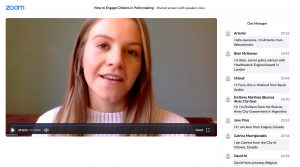Participation
A global public engagement talk – while still wearing my slippers
February 19, 2020 by Niamh Webster No Comments | Category Democracy, digital platforms, Our work, Training & Skills
Read Niamh Webster’s presentation from Apolitical’ s online workshop on public engagement in policymaking.
Imagine giving a presentation to 700 people all over the world while still wearing your slippers. This happened to me recently. No, not a bad dream, just speaking at a global Apolitical online workshop. Sitting at my kitchen table on video call, I shared my experience of involving people in government’s work. Read what I said below.
‘This went so beyond policymaking in all the right ways’
Scrolling through the lively chat window at the end of the workshop, one comment really stood out. ‘This went so beyond policymaking in all the right ways’; which just shows the breadth of this kind of work – and how for me it’s all about new ways of doing democracy. It was a real privilege to speak to people from places as diverse as Saudi Arabia, Canada and Chile and organisations like the UN. Thanks again to Apolitical for hosting and my fellow panellist Noreen Blanluet for a really interesting chat. Thanks also for the opportunity to join from the comfort of my own home. Glad you didn’t spot the slippers.
Read my presentation and list of resources and references below
Watch the recording of my presentation (I start 16 mins in) and discussion
Read the discussion between participants
My presentation: (2 min read)
“I want to start by not talking about digital. Before joining government I worked in democracy organisations, getting governments to involve people in shaping the world around them. I joined the civil service to work specifically on open government – which was also all about getting government to involve people. Now, in my current role as digital engagement manager, I’m trying to do that online.
Digital engagement means using technology to involve people in decision-making. I’m not a techy person, so I bring my democracy head to this digital world.
In Scotland there has been a massive amount of progress in democratic engagement, which I’ll talk more about later. But we’ve not yet cracked the online bit. Even globally, I don’t think anyone really has. At least not in the same way we’ve replicated offline methods. So this is what I’m interested in exploring now.
I moved into digital because there’s so much potential here. There’s so many benefits and uses for digital. The main benefits I see are reaching more people and ease of engaging. Importantly, you can get different types of contributions than formal consultation responses. This helps break down barriers to getting different voices heard. BUT remember digital is not about replacing face-to-face. Instead, it’s about augmenting what engagement you’re already doing.
Today I’ll talk about…
Today I’ll talk about Scottish context, ambition, what we’re doing now and the role of digital in future.
We’re already working in a strategic context where it’s important to put people at the heart;
- The Community Empowerment (Scotland) Act 2015 leaps and bounds in bringing people and power closer together through land ownership and participation requests
- We have initiatives like the Open Government Partnership – we’re part of international collaboration of governments around the world, and we have commitments to transparency, accountability and citizen participation here in Scotland.
- And values in the National Performance Framework guide all our work in the public sector. It includes values like ‘being loved’, and ‘treating people with kindness’ at its core.
Hopefully this highlights our ambition is to build trust and address inequality. Beyond participation for participation’s sake, more needs to be done to put citizen voice in place to make this a reality.
Where we are and what we’re doing
So where are we and what are we doing in practical terms? In our team, we’re running the online consultation platform (which helped to streamline and improve the quality of the old traditional written survey). We recently trialled digital engagement options like a chatbot (on Facebook Messenger – which was a great, informal way to get input). And we’re now setting up a new ideation platform which will look something like an online repository; a ‘post it note board’ of ideas for discussion, which will outlast project as a legacy.
Role of digital
There will be a role for digital in achieving the wider ambition. We know digital engagement has to be more than just online consultations and surveys!
I recently blogged about how we have David Attenborough to thank for citizen assemblies hitting the headlines. Speaking at the UK Climate Assembly a few weeks ago, the reaction to Sir David’s presence shows the popularity of these new methods and ways of doing democracy.
Citizen assemblies are one example of ‘deliberative democracy’. Deliberative democracy means a sample of the population discusses and helps make (often very difficult and divisive) political decisions.
I was at an OECD international citizen participation network meeting in Manchester recently. They presented research which shows the increase of popularity for deliberative democracy is happening all over the world. It’s a global trend worth paying attention to.
I am interested in how digital supports these kinds of processes. There’s a citizen assembly on climate change in Scotland coming soon – one to watch!
International learning
I said before that I don’t think anyone has really nailed effectively supporting meaningful public participation using technology and digital. But there are many good international examples of people doing this well across the world. They’re using digital democracy or civic tech (tech designed specifically for democratic purposes);
- In Spain, they use a platform to get ideas from people which are then developed by permanent citizen panel before debated by politicians;
- In France, they’re using platforms to support the Climate citizen assemblies by providing a space for discussion by the wider public which is then fed in as submissions to the assembly members. Another example, this time in Paris, they’re using digital to support ideation and voting in their participatory budgeting for the city.
I’ve no time to go into detail now because there’s so many examples and no shortage of tools and platforms. But that really sums it up for me…
My ‘reason to be cheerful’ is that there’s so much enthusiasm and momentum for new ways of doing democracy. The challenge now is to work out how digital supports this, and make sure change is here to stay.
Thank you”
Resources mentioned
- Blog I wrote this month on global trends of deliberative democracy
- Scottish context: community empowerment Act. Open government commitments and values in our National Performance Framework guide our work.
- David Attenborough speaks at UK Climate Assembly
Digital democracy:
- There’s so many good examples of people doing this well internationally. They’re using digital democracy or civic tech (tech designed specifically for democratic purposes)
-
- Spain use DecideMadrid platform get ideas from people developed by permanent citizen panel before debated by politicians read the full report
- France using ‘Contribuez’ digital platform to get wider public engagement submissions as evidence for their Climate citizen assemblies and participatory budgeting in Paris, also digital participatory budgeting in Scotland
- Digital Democracy report from Nesta, a few years old now so bit out of date, but useful definitions of digital democracy, good practice and examples.
- I will be speaking at TicTec conference 2020 (the impact of civic technologies)– in Iceland at end of March. Encourage anyone who is interested in digital democracy and civic technology – or how digital supports engagement more widely to watch this conference outputs or even come to Iceland if they can
Toolkits:
- No shortage of toolkits but what’s useful depends on your national context, and the purpose of engaging. Be clear on why you need to engage, what do you need to know from people, then pick a method (online or offline).
- See Commitment 2 for an overview of the Participation Framework we are building in Scotland
- A nice participatory methods toolkit from Northern Ireland even though is now 6 or 7 years old
- National community engagement standards
- I like this storytelling resource from the Open Government Partnership:ogpstories.org
——————————————————————————————————–
Niamh is the Digital Engagement Manager at the Scottish Government. Niamh advises policymakers on using engagement methods to make sure people are meaningfully involved. She previously worked in open government, so her approach is very much about putting people at the heart of policymaking. She is now exploring how traditional offline ways of involving the public can be done online.
Twitter:niamhwebster
LinkedIn: niamhwebster
Tags: apolitical, deliberative democracy, digital democracy, international, learning, online workshop, presentation, training, webinar



Leave a comment